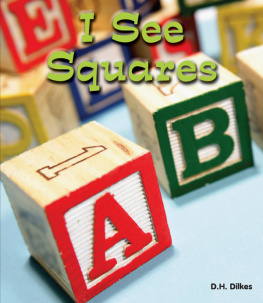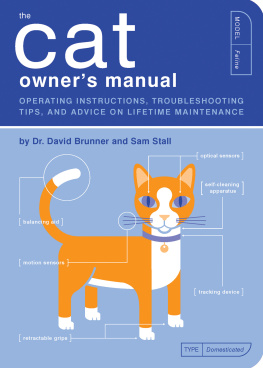John Brunner - The Squares of the City
Here you can read online John Brunner - The Squares of the City full text of the book (entire story) in english for free. Download pdf and epub, get meaning, cover and reviews about this ebook. year: 1965, publisher: Ballantine (Del Rey), genre: Detective and thriller. Description of the work, (preface) as well as reviews are available. Best literature library LitArk.com created for fans of good reading and offers a wide selection of genres:
Romance novel
Science fiction
Adventure
Detective
Science
History
Home and family
Prose
Art
Politics
Computer
Non-fiction
Religion
Business
Children
Humor
Choose a favorite category and find really read worthwhile books. Enjoy immersion in the world of imagination, feel the emotions of the characters or learn something new for yourself, make an fascinating discovery.
- Book:The Squares of the City
- Author:
- Publisher:Ballantine (Del Rey)
- Genre:
- Year:1965
- Rating:3 / 5
- Favourites:Add to favourites
- Your mark:
- 60
- 1
- 2
- 3
- 4
- 5
The Squares of the City: summary, description and annotation
We offer to read an annotation, description, summary or preface (depends on what the author of the book "The Squares of the City" wrote himself). If you haven't found the necessary information about the book — write in the comments, we will try to find it.
The Squares of the City — read online for free the complete book (whole text) full work
Below is the text of the book, divided by pages. System saving the place of the last page read, allows you to conveniently read the book "The Squares of the City" online for free, without having to search again every time where you left off. Put a bookmark, and you can go to the page where you finished reading at any time.
Font size:
Interval:
Bookmark:
Copyright 1965 by John Brunner
ISBN 0-345-27739-2
e-book ver. 1.0
The story told by John Brunner in The Squares of the City held me spellbound from beginning to end. It had a special attraction for me because all the people in the book are chess-mad, and chess is my favorite pastime. But even the reader who knows nothing about the game will be thoroughly fascinated by this story in which the two chief political antagonists in a South American country attempt to direct the actions of their followers by using the unconscious but powerful influence of "subliminal perception," a technique which may well threaten all our futures.
Under its baleful persuasion, members of the two hostile parties commit all sorts of crimes as they unknowingly carry out the actions suggested to them by a confidant of their leaders who is an expert in subliminal perception and who is the Director of the television network that controls The City. Only gradually does one realize that The City is a chessboardits chief inhabitants taking actions that are the counterparts of moves in a vicious game of chess being played out by their leaders.
The author has added an ingenious twist to his story which will be particularly intriguing to chess fans. The game in which his characters move as living pieces has not been artificially designed by him to suit the progress of his plot. It had actually been played, move for move, some seventy years ago in a match for the world championship between the title holder, the American master William Steinitz, and the Russian master Mikhail Ivanovich Tchigorin.
Edward Lasker, M.E., E.E.
On the flight down from Florida I talked with my seat companionor, to be more exact, he talked at me. He was a European-born Jew in his middle fifties whose family had been thrown out by a Nazi invasion early in World War Two, but although he was very proud of the fact that he spoke with a European accent and said so at least a dozen times"You have noticed my accent, of course!"I didn't manage to establish his actual place of origin.
He had not been "home" for four years, and in fact appeared to have spent much more time in the States than he had in Aguazul, but there was no questioning his fervor for his adopted country. He insisted on addressing the stewardess in ludicrously bad Spanishworse even than minealthough on this route, of course, all the stewardesses spoke English, Spanish, and Portuguese with equal fluency. And when the plane was circling in toward landing, he almost climbed into my lap in an effort to point past me through the porthole and indicate locations of interest in Vados.
Eventually the stewardess commanded him sternlyin Englishto fasten his seat belt. I think it was more the fact that she addressed him in a "foreign" language than the actual order that made him calm himself and sit down. After that I was able to close my mind, if not my ears, to his glowing descriptions.
I forebore to tell him (it would have been very unkind) that although I had never set foot in Vados, I almost certainly knew more about the city than he didmore indeed than any of its citizens who hadn't deliberately tramped the streets for a week on end, exploring and observing. I knew that ten years or so before they had gone to a barren, rocky stretch of land and decreed that there should be a new capital city; they had built roads and put wild mountain torrents into concrete conduits and hoisted solar electricity generators into the surrounding hills, first on muleback and then by helicopter into places where even a mule could not scramble. Now it was a flourishing city of half a million people.
I had studied the essential structure of the city, too: developed organically from four gigantic plazas or squares, modulated by the three great traffic arteriessix-lane superhighways with ten-foot shoulders clear from Astoria Negra and Puerto Joaquin on the coast, and Cuatrovientos, the oil center on which the wealth of Aguazuland therefore the citywas ultimately based.
But, looking down on the reality as the plane nosed toward the airport cut in the mountainside, I felt a stir of my seat companion's excitement.
For I suppose I had never before seen anything so completely of the twentieth century.
"Ten years ago," I said to myself, "this was wasteland. Scrub. Rock. And now look at it." A shiver of awe clambered down my spine. My feelings must have shown in my expression, for my companion chuckled.
"Magnifico, no?" he said with a smirk of satisfaction, as though he himself had been responsible for the graceful towers, the splendid avenues, the richly flowering parks.
It did indeed look magnificent. Butif it was as good as it looked, I wouldn't have been here. I hesitated over whether or not I should try to explain, and in the end said nothing.
When we parted in the customs hall of the air terminal, my temporary acquaintance insisted on shaking my hand and giving me his card. The name on it was Flores, with an address on Madison Avenue and another right here in Vados.
Flores. Blum? I wondered. Rosenblum? Possibly; the intervening years had smoothed out his vaunted European accent till it was cosmopolitan, featureless.
He was torn between a desire to continue bragging of his adopted homeland to a stranger and the wish to take his place in the citizens' line at the customs desk, asserting his national rights. In the end the latter pull triumphed. But before we separated, his hand shot out and indicated a picture placed not conspicuously, but visiblybehind the customs officers.
"That's a great man!" he said impressively. "The man they named Vados for, of course. El Presidente !"
I was apparently the only alien aboard the plane this flight, and, as happens most places these days, the natives received precedence. I went to a bench across the narrow hall and lit a cigarette, composing myself to wait.
The hall was quiet, lined with sound-absorptive material; although the sun beat down pitilessly on the gray concrete of the runways outside, in here it was cool. The light came through high green louvers, and not a single fly buzzed through the still air. That in these latitudes was an achievement. I occupied myself by looking at the picture. It was not only that I was interested in the appearance of a man who could have a city called after him in his own lifetime, and a capital city, moreover. He was also indirectly my new employer. Officially I would be responsible to the Ciudad de Vados city council, but Vados was mayor of the city as well as president of the republic, and from everything I had heard it seemed that what he said was what counted.
The portraitwhich, of course, had no captionshowed el Presidente in a plain white suit. A thin black tie seemed to cut his chest into equal halves. His heavy-set body was carried erectly, in a military posture; he gave the impression of tall-ness, and I knew he was in fact over six feet. He had been taken gazing directly into the camera and so directly at me where I sat studying him. The picture was very well done and suggested a certain immediacy of presence. His face was very pale in contrast to his thin black moustache and smooth dark hair. He grasped a gold-knobbed swagger cane in both hands as if intending to twist the ends in opposite directions and make it as spiral as a piece of sugar-candy.
Juan Sebastian Vados. A lucky man, an astute man. And, Flores had claimed, a great man. Certainly a brilliant one: for more than twenty years now he had ruled Aguazul, and he had prosperity and contentment to show for itnot to mention Ciudad de Vados, the greatest showpiece of all.
I grew aware that I was being beckoned. I dropped my cigarette in a sand bowl and crossed the resilient floor to the customs desk. A porter trundled my bags down a roller conveyor to within reach of the official who had waved to me. This was a swarthy man in a severe black uniform with silver rank badges; his fingers were discolored with the blue chalk used for okaying passengers' bags.
Font size:
Interval:
Bookmark:
Similar books «The Squares of the City»
Look at similar books to The Squares of the City. We have selected literature similar in name and meaning in the hope of providing readers with more options to find new, interesting, not yet read works.
Discussion, reviews of the book The Squares of the City and just readers' own opinions. Leave your comments, write what you think about the work, its meaning or the main characters. Specify what exactly you liked and what you didn't like, and why you think so.









